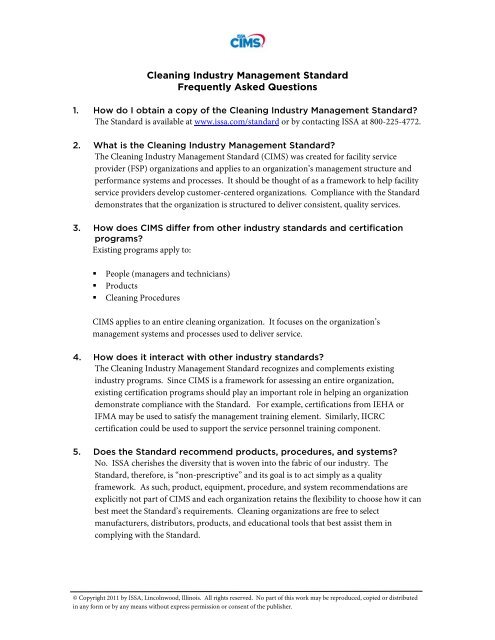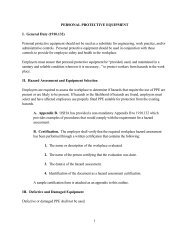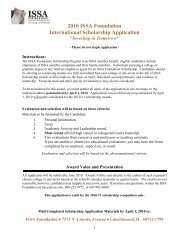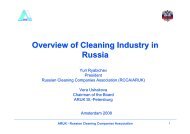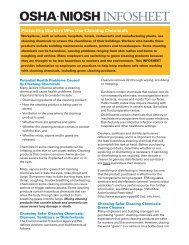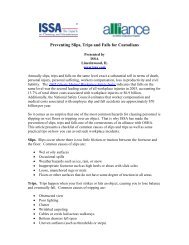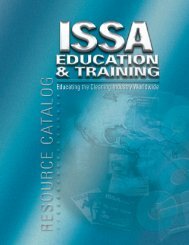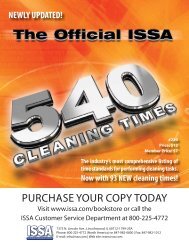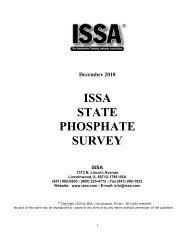Cleaning Industry Management Standard Frequently ... - ISSA.com
Cleaning Industry Management Standard Frequently ... - ISSA.com
Cleaning Industry Management Standard Frequently ... - ISSA.com
Create successful ePaper yourself
Turn your PDF publications into a flip-book with our unique Google optimized e-Paper software.
<strong>Cleaning</strong> <strong>Industry</strong> <strong>Management</strong> <strong>Standard</strong><strong>Frequently</strong> Asked Questions1. How do I obtain a copy of the <strong>Cleaning</strong> <strong>Industry</strong> <strong>Management</strong> <strong>Standard</strong>?The <strong>Standard</strong> is available at www.issa.<strong>com</strong>/standard or by contacting <strong>ISSA</strong> at 800-225-4772.2. What is the <strong>Cleaning</strong> <strong>Industry</strong> <strong>Management</strong> <strong>Standard</strong>?The <strong>Cleaning</strong> <strong>Industry</strong> <strong>Management</strong> <strong>Standard</strong> (CIMS) was created for facility serviceprovider (FSP) organizations and applies to an organization’s management structure andperformance systems and processes. It should be thought of as a framework to help facilityservice providers develop customer-centered organizations. Compliance with the <strong>Standard</strong>demonstrates that the organization is structured to deliver consistent, quality services.3. How does CIMS differ from other industry standards and certificationprograms?Existing programs apply to:• People (managers and technicians)• Products• <strong>Cleaning</strong> ProceduresCIMS applies to an entire cleaning organization. It focuses on the organization’smanagement systems and processes used to deliver service.4. How does it interact with other industry standards?The <strong>Cleaning</strong> <strong>Industry</strong> <strong>Management</strong> <strong>Standard</strong> recognizes and <strong>com</strong>plements existingindustry programs. Since CIMS is a framework for assessing an entire organization,existing certification programs should play an important role in helping an organizationdemonstrate <strong>com</strong>pliance with the <strong>Standard</strong>. For example, certifications from IEHA orIFMA may be used to satisfy the management training element. Similarly, IICRCcertification could be used to support the service personnel training <strong>com</strong>ponent.5. Does the <strong>Standard</strong> re<strong>com</strong>mend products, procedures, and systems?No. <strong>ISSA</strong> cherishes the diversity that is woven into the fabric of our industry. The<strong>Standard</strong>, therefore, is “non-prescriptive” and its goal is to act simply as a qualityframework. As such, product, equipment, procedure, and system re<strong>com</strong>mendations areexplicitly not part of CIMS and each organization retains the flexibility to choose how it canbest meet the <strong>Standard</strong>’s requirements. <strong>Cleaning</strong> organizations are free to selectmanufacturers, distributors, products, and educational tools that best assist them in<strong>com</strong>plying with the <strong>Standard</strong>.© Copyright 2011 by <strong>ISSA</strong>, Lincolnwood, Illinois. All rights reserved. No part of this work may be reproduced, copied or distributedin any form or by any means without express permission or consent of the publisher.
6. How is the <strong>Standard</strong> administered?The <strong>Standard</strong> is administered by <strong>ISSA</strong>. <strong>ISSA</strong>, a not-for-profit association founded in 1923,prides itself on being the leading association for the cleaning industry worldwide. <strong>ISSA</strong>administration ensures that there is no <strong>com</strong>mercial bias to any group.7. Who developed the <strong>Standard</strong>?The <strong>Standard</strong> was developed through a true consensus-based process. Experts,representing all sectors of the industry, including the facility management and purchasing<strong>com</strong>munities, were selected by the <strong>ISSA</strong> Board, staff, and alliance partners to participate onstandard-development Technical Committees. The <strong>com</strong>mittees worked directly with <strong>ISSA</strong>and its partner, the American Institute for <strong>Cleaning</strong> Sciences (AICS) to draft the <strong>Standard</strong>,which was subject to full peer review prior to official publication.8. What was <strong>ISSA</strong>’s role in developing the <strong>Standard</strong>?<strong>ISSA</strong> provided organizational oversight by leveraging its unique role in the industry. <strong>ISSA</strong>’sdiverse membership is <strong>com</strong>prised of:• Manufacturers• Distributors• Manufacturer Representatives• Facility Service Providers• <strong>Industry</strong> ConsultantsThe shared interests of its membership base enabled <strong>ISSA</strong> to provide the necessaryoversight. In addition, the many alliances that <strong>ISSA</strong> has developed with leadingorganizations in the cleaning and facilities management industries lent valuable insight toensure a balanced and <strong>com</strong>prehensive approach.9. What does the <strong>Standard</strong> consist of?The <strong>Standard</strong> is based on universally accepted management principles and consists of fivesections of management best practices:1. Quality Systems2. Service Delivery3. Human Resources4. Health, Safety, and Environmental Stewardship5. <strong>Management</strong> Commitment10. What does it mean to be<strong>com</strong>e certified to the <strong>Standard</strong>?Certification indicates that an organization conforms to the requirements set forth in the<strong>Standard</strong> and has successfully demonstrated <strong>com</strong>pliance to an independent, accreditedassessor.© Copyright 2011 by <strong>ISSA</strong>, Lincolnwood, Illinois. All rights reserved. No part of this work may be reproduced, copied or distributedin any form or by any means without express permission or consent of the publisher.
Building service contractors will find that the <strong>Standard</strong> will help them:• Distinguish themselves from their <strong>com</strong>petitors• Improve their bottom line• Better meet the demands of their customers• Improve the overall quality of their services16. What role will distributors and manufacturers play?Distributors, manufacturers and manufacturer representatives will play an essential role.Since the <strong>Standard</strong> rewards systemic approaches to product selection, training, andmanagement it will be a catalyst for sales. Other benefits include:• Closer ties to customers• Enhanced professional image for the industry• Growth opportunities• Distinctive marketing position• Business resource to customersDistributors, manufacturers, and others are encouraged to be<strong>com</strong>e “<strong>ISSA</strong> CertificationExperts” (I.C.E.) to uniquely position themselves to assist their facility service providercustomers in preparing for CIMS certification17. What is the role for industry consultants?The <strong>Standard</strong> creates numerous opportunities for industry consultants. Consultants benefitas FSP organizations seek expertise to assist them in developing programs to meet the<strong>Standard</strong>, thereby creating a vast array of service opportunities. Training, documentation,and quality assurance are just a few of the services that will be needed.18. How is CIMS different from ISO?CIMS and ISO are similar in many respects, but CIMS has the advantage of having beendeveloped specifically "by the cleaning industry and for the cleaning industry" (with a largedose of assistance from the facility management and purchasing <strong>com</strong>munities).The fact that the program was developed specifically for the cleaning industry offerstangible benefits. First of all, CIMS deals with the unique issues faced by cleaningorganizations on a daily basis (ISO was originally developed for manufacturing and wasdrafted to speak to that industry). Second, <strong>com</strong>pliance with the <strong>Standard</strong> is determined byan individual who is an expert in the cleaning industry. One of the primary concerns withISO, as it applies to the cleaning industry, centers on the fact that the auditors generally donot know anything about the particulars of our industry. The CIMS assessors, on the otherhand, are required to have practical industry experience and, therefore, truly understand itsunique nature.© Copyright 2011 by <strong>ISSA</strong>, Lincolnwood, Illinois. All rights reserved. No part of this work may be reproduced, copied or distributedin any form or by any means without express permission or consent of the publisher.


